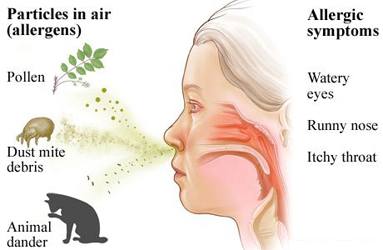Effective treatment for allergic rhinitis can help you keep your
asthma under control. Find out what triggers your allergic rhinitis and
asthma. Try to avoid your allergy triggers if you can.
Nasal sprays that contain corticosteroids (a type of
anti-inflammatory medicine) are the most effective treatments available
for allergic rhinitis. People who have both asthma and allergic rhinitis
should use both a preventer nasal spray and an asthma preventer inhaler
regularly. Nasal sprays are most effective when used correctly
Don’t smoke and avoid other people’s cigarette smoke. Smoke can
make allergic rhinitis and asthma worse, and can stop medicines from
working effectively.
Tell your doctor if you take any medicines for allergic rhinitis.
You may need to see a specialist if you have severe allergies (such as
food allergies or severe skin rashes), symptoms that are not typical of
allergic rhinitis (such as a constantly blocked or bleeding nose just on
one side), or if your symptoms are not getting better with medication.

Allergic rhinitis facts
- Allergic rhinitis is a medical condition caused by allergy to substances breathed in the air
- Most people with allergic rhinitis are allergic to house dust mites,
pets, pollen or molds, or a combination of these. Allergic rhinitis is
sometimes called ‘hay fever’ when it occurs during the times of year
when there are a lot of pollens in the air
- The allergic reaction makes the inside of the nose irritated,
swollen and abnormally sensitive (inflamed). It also affects the back of
the mouth and the throat
- A person with rhinitis may have a blocked or runny nose, and may experience itching or soreness in the nose, throat and eyes
- Allergic rhinitis can also disturb sleep and cause problems with concentration at work or school.
- Approximately 15% of Australians have allergic rhinitis, but it is even more common among people with asthma
- At least three out of four people with asthma also have allergic rhinitis
- Asthma and allergic rhinitis are related health conditions. People
with allergic rhinitis have a higher chance of going on to develop
asthma than people without allergic rhinitis
Can allergic rhinitis make asthma worse?
Allergic rhinitis can make asthma harder to control. People with
asthma who also have allergic rhinitis have more visits to hospital or
emergency departments and more time off work or school than other people
with asthma. Some people find that the things that trigger their asthma
will also make their allergic rhinitis worse. These could include
things they are allergic to (allergens) or cold air, cigarette smoke or
other irritating fumes. Effective treatment for allergic rhinitis may
reduce the chance of severe asthma attacks and make the lungs work
better.
